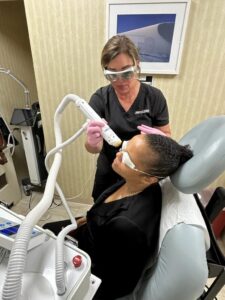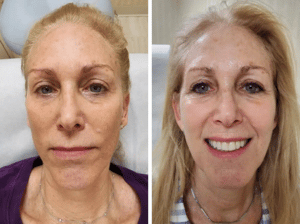In the quest for flawless skin, one may face the question of chemical peel vs laser treatment. Both offer remarkable results. Understanding their nuances, however, is key to choosing the best option for your skincare needs.

What is a Chemical Peel?
A chemical peel is a procedure that involves applying a chemical solution to the skin to remove the outer layers. This process exfoliates the skin producing a variety of benefits. For some the treatment improves the complexion treating fine lines, sun damage and blemishes from acne. The peeling effect helps with conditions such as melasma, warts, and even pre-cancerous lesions such as actinic keratoses. As chemical peels also unplug pores they are a popular choice in the treatment of acne.
Chemical peels come in different strengths – superficial, medium, and deep – depending on the depth of penetration required and the skin concern being addressed.
Superficial peels are mild and primarily target the outermost layer of the skin, improving texture and brightness. Medium peels penetrate deeper, addressing issues like fine lines, sun damage, and mild acne scarring. Deep peels are the most intense, effectively treating severe wrinkles, deep scars, and significant sun damage. Deep chemical peels have largely been replaced with laser treatment.
How laser treatments work
Lasers, on the other hand, are devices which utilize concentrated beams of light to target specific tissues. Lasers can produce exfoliation as would occur with a chemical peel. Laser peeling tends to be more focused and targeted , however, so they can do other things. Depending on the type of laser, the device can also target an area deep in the skin, such as a blood vessel or pigment, without necessarily affecting the more superficial layers of the skin. Therefore, lasers can be used to peel, but also treat conditions such as acne, melasma, facial redness, facial veins without producing a peeling effect. The type of laser used and its wavelength determine its effects, and efficacy for different issues.
Subscribe to our YouTube channel!
Chemical Peel vs Laser Treatments for Acne
Both chemical peels and laser treatments can be effective in treating acne and acne scars. Chemical peels work by exfoliating the skin, reducing inflammation and unclogging pores. This reduces the occurrence of breakouts and improves overall skin texture. They can also help fade hyperpigmentation and acne scars over time by promoting cell turnover and collagen production.
Some laser treatments for acne target the sebaceous glands and bacteria responsible for acne formation. By reducing oil production and killing acne-causing bacteria, laser therapy can significantly decrease acne inflammation and prevent future breakouts. Additionally, laser treatments can improve the appearance of acne scars by stimulating collagen production and promoting skin renewal by working deeper in the skin. One of the benefits of laser for acne over chemical peels is that there is no peeling or downtime.

Chemical peels vs laser treatment: do you have to choose?
Certain laser treatments, such as the Aerolase Neo, can be combined with chemical peels for faster results in treating acne, melasma, post inflammatory hyperpigmentation and rejuvenation. The laser treatment targets deeper tissue reducing redness, stimulating collagen, and breaking up pigment preparing it for removal by exfoliation with the peel. Using both approaches can create more impact.
READ next: Microneedling vs chemical peel
In conclusion: laser vs chemical peel
While chemical peels and laser treatments both offer impressive results for skin rejuvenation, they differ in their mechanisms of action and applications. Chemical peels exfoliate the skin using chemical solutions. Laser treatments utilize concentrated light beams to target specific tissues to treat skin concerns. Lasers can produce exfoliation as well as other effects. Understanding the differences between these treatments is crucial in choosing the most suitable option for your skincare goals. To get the best care make sure you work with a professional who is an expert, like our doctor, both in your condition, skin type and technology. Schedule a consult with our board-certified dermatologist, Dr. Dina Strachan, to determine the best treatment plan for your individual needs be it a medical treatment, surgical option, chemical peel, laser treatment or a combination.


